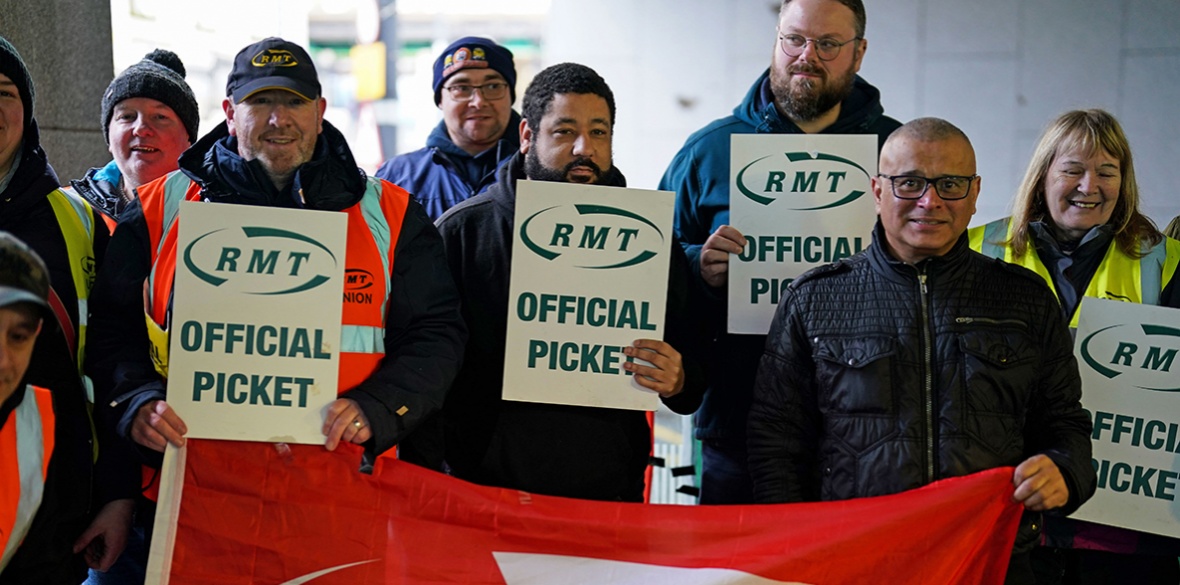This is the last article you can read this month
You can read more article this month
You can read more articles this month
Sorry your limit is up for this month
Reset on:
Please help support the Morning Star by subscribing here
THIS year’s STUC comes at a time when Scottish RMT members on the railway and in maritime face significant challenges.
The last 12 months have seen a significant contribution made to the national rail dispute.
Members working on train companies that operate cross-border services between England and Scotland took significant strike action which meant they secured a no-strings-attached pay rise for one year.
Scottish members held some of the finest picket lines, and no doubt if they’re called upon again, they will meet the challenge with the same vigour as they have shown throughout our national dispute.
Their colleagues in ScotRail also face industrial challenges, stemming from the unnecessary decision by their bosses to undermine the safety-critical role and responsibility of the guard on the train and in despatch.
Our members are currently being balloted, and we are expecting a significant Yes vote in favour of strike action.
Following the union’s successful campaign to keep ticket offices on national rail open, RMT has written to the Scottish government insisting that it rule out the significant cuts to ticket offices that were proposed by former operator Abellio in 2022, and which successive transport ministers have failed to dismiss.
The proposed cuts were universally opposed by passengers in the public consultation and the massive scale of the response to the ticket office closure plans elsewhere on the railway reinforces how much passengers value ticket offices and ticket office staff.
And that is no different in Scotland.
The Scottish government’s own research into women’s and girls’ safety on public transport has found that staffed ticket offices make them feel safer.
We have therefore called on the minister to demand Scottish government to urgently confirm once and for all that it will not inflict any short-sighted and damaging cuts to ScotRail ticket offices.
We have also been campaigning against massive cuts to Scottish Network Rail renewals and maintenance work.
Scottish railways are likely to have major safety-related incidents in the next two years, according to our own members in Network Rail.
Some 92 per cent of those surveyed said that a major rail safety incident occurring on the railway within the next two years was “likely” with 45 per cent saying it was “very likely.”
The Scottish government decides the funding envelope for Network Rail for each five-year control period so it must take responsibility and restore the £315 million funding that is due to be lost.
It is not only railway workers who are engaged in important industrial and campaigning work.
Our members in CalMac lifeline ferries who provide a vital service to the Scottish Isles are facing major uncertainty over whether the service will remain in public ownership or be tendered out to a private contractor.
CalMac Ferries is a national asset, employing nearly 2,000 skilled seafarer, port, clerical and Head Office staff to deliver lifeline services on 29 routes from nearly 50 harbours on the Clyde and Hebrides network.
The company is an industry leader in employment and training but the Scottish government’s failure to secure new ships on time over the last six years is jeopardising the future of our members’ jobs and that of the public-sector operator itself.
Our members continue to work hard to maintain services but nearly 70 per cent of the 34 publicly owned vessels in the fleet are 20 years old or over and key infrastructure is failing.
Tendering the next contract would introduce more instability and could hand the six new publicly funded ferries due for delivery by October 2025 to a private operator like P&O.
Former chief executives at CalMac and Ferguson Marine have left their posts recently but that won’t change the fact that this crisis is the direct result of procurement failure, not performance at CalMac where our members continue to work hard to maintain services.
Seeing the Glen Rosa officially launched into the Clyde earlier this month stirred memories of the historic might of Scotland’s shipbuilding industry but it’s not certain that CalMac will operate this vessel when it enters service in autumn 2025.
Neither is the future of Scotland’s remaining public-sector shipbuilder certain, despite the guaranteed pipeline of public-sector contracts for Clyde and Hebrides Ferries, Northern Isles and inter-island ferries over the next decade and beyond.
The Scottish government must not pursue the path of privatisation of CalMac which would severely undermine the quality, safety and employment standards integral to lifeline public ferry services.
Public investment in Scotland’s workers, passengers, vessels and ports is vital to prevent further encroachment from cost-cutting and profit-seeking privateers.
CalMac’s current contract expires on September 30 and RMT is campaigning for a permanent direct award of the Clyde and Hebrides Ferry Service contract to CalMac.
Directly awarding the contract to CalMac is supported by the SNP, Scottish Labour and cross-party MSPs on the net zero, energy and transport committee.
And our union will continue to make the case at campaign events and public meetings on the Scottish Islands and at fringes like the one today at STUC advocating for People’s CalMac.
Mick Lynch is general secretary of RMT.










